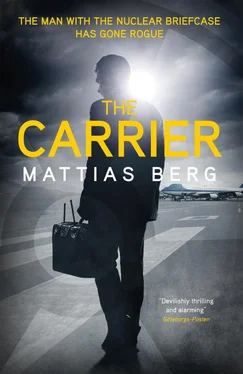Mattias Berg - The Carrier
Здесь есть возможность читать онлайн «Mattias Berg - The Carrier» весь текст электронной книги совершенно бесплатно (целиком полную версию без сокращений). В некоторых случаях можно слушать аудио, скачать через торрент в формате fb2 и присутствует краткое содержание. Город: London, Год выпуска: 2019, ISBN: 2019, Издательство: MacLehose Press, Жанр: Триллер, на английском языке. Описание произведения, (предисловие) а так же отзывы посетителей доступны на портале библиотеки ЛибКат.
- Название:The Carrier
- Автор:
- Издательство:MacLehose Press
- Жанр:
- Год:2019
- Город:London
- ISBN:978-0-85705-788-4
- Рейтинг книги:4 / 5. Голосов: 1
-
Избранное:Добавить в избранное
- Отзывы:
-
Ваша оценка:
- 80
- 1
- 2
- 3
- 4
- 5
The Carrier: краткое содержание, описание и аннотация
Предлагаем к чтению аннотацию, описание, краткое содержание или предисловие (зависит от того, что написал сам автор книги «The Carrier»). Если вы не нашли необходимую информацию о книге — напишите в комментариях, мы постараемся отыскать её.
The Carrier — читать онлайн бесплатно полную книгу (весь текст) целиком
Ниже представлен текст книги, разбитый по страницам. Система сохранения места последней прочитанной страницы, позволяет с удобством читать онлайн бесплатно книгу «The Carrier», без необходимости каждый раз заново искать на чём Вы остановились. Поставьте закладку, и сможете в любой момент перейти на страницу, на которой закончили чтение.
Интервал:
Закладка:
Without warning, the two women came back up to me. Put themselves, as I was now, with their feet on either side of the steep tunnel. If anything, it was even harder to stand still like that: Ingrid Bergman had also planted herself next to me, lest my legs gave way. Muttered something overblown about needing to make arrangements for security, to put us beyond the reach of angels .
And in those circumstances it was not difficult to let them take the briefcase from me.
When Ingrid Bergman reached toward my left hand, I tried at first to put up some resistance. Then I gave in, put my blind trust in her: my lecturer, supervisor and mentor.
She took the briefcase in her left hand, slid down gently like a skier, until she found a position where she could put it on her knees. Used the combat pack on her back as a cushion against one rough wall, boots braced against the other. Then she reached over her right shoulder and took out a wrinkled piece of paper from one of her pack’s outer pockets.
The light-emitting diodes on the tunnel wall cast a weak red sheen over the sketch. Yet even from this distance, about fifteen feet now that she had slithered down, I could see on the paper an outline of the inside of the briefcase—but covered in thin, penciled lines, arrows and strokes in different directions.
I wondered why she did not light her headlamp, but got my answer a moment later.
“It’s easier to do this if the light’s better. But I don’t think we want to illuminate ourselves more than necessary,” she said.
The Nurse and I positioned ourselves as Ingrid Bergman had, backs against one wall and legs against the other: my upper body throbbed with the effort. Then we both pushed forward from the walls to be able to see as much as possible. As close to her as we could—without coming too close to each other.
“I’m not sure that we need to be doing this already. Whether the Test Rooms remain connected to the outside world. But let’s assume so in any case, as a hypothesis, which will force us once and for all to cut off contact with our old friends.”
Ingrid Bergman held up the paper in the light from the diodes. Tilted it in my direction, away from the Nurse.
“Have you seen, Erasmus? Quite the piece of handicraft from hell!”
I began to make out what the lines and arrows on the sketch represented. The wiring itself inside the briefcase, the thing that would always allow them to know the briefcase’s position. It had been kept secret even from me. I could never find it, however much I had, over long hours, fiddled about with the innermost parts of the briefcase.
I had supposed it to be a single point—most likely the usual G.P.S. transmitter, which our technicians forever managed to make smaller—rather than this elegantly constructed pattern. According to the sketch in Ingrid Bergman’s hand, the wires ran into and out of the heart of the apparatus, resembling a medieval tapestry: there seemed to be no possibility of removing them without setting off both an alarm and a local explosion. Which would expose and obliterate whichever enemy had somehow managed to come by the briefcase and attempted to remove the tracking system. At the same time, it would destroy the briefcase, rendering it unusable. Just as they had assured us.
Now Ingrid Bergman put the sketch between her teeth and, leaning forward over the precipitous pathway of the tunnel, flipped open the briefcase. She seemed to have mastered the hand movements at least as reflexively as I had, the waltz of the little fingers, the ritual for revealing the keyboard. Then she held the drawing up in the dark red glow of the diodes.
“What do you reckon?” she said.
I could not find an answer, did not know what she wanted me to say. Then I heard the Nurse’s dark voice.
“Like, impossible. Two optic fibers, twisted hard around themselves, so thin that you’re meant to think they’re a single fiber. I know there has to be a way. But do you really want me to try, Ingrid?”
“What happens if you don’t succeed? Hell-fire?”
“Apart from the fact that alarms will instantly go off at Centcom and we’ll be sending smoke signals for everybody who wants to know where we are? No fucking idea. I just followed the drawing the technicians gave me, like a sewing pattern. But those lunatics can think up pretty much anything.”
Ingrid Bergman seemed to hesitate for a moment before nodding at the Nurse. There was so much we did not know. A cloud of secrets among us. Nobody wanted—or was allowed to have—the whole picture . Not even Alpha.
With great care, the Nurse lifted the open briefcase off Ingrid Bergman’s lap and set it on her knees and then took three sizes of scalpel from her medical pack. I looked at my wrist-watch as she started: 10.24, September 6, 2013. Perhaps, I thought, this was as far as our escape and our lives would go.
The Nurse opened and closed the briefcase a few times, all the right hand movements, her little fingers each on the correct points. Kept feeling around the leather cover of the metal case. Leaned forward, listened, as we were trained to do: trying to catch the mechanism’s own breathing.
I glanced at Ingrid Bergman. She was following developments with as much apprehension as I was, her nervousness seemed genuine. The Nurse picked up one of the scalpels and tested it on the outside of the briefcase—before she chose a second one with a thinner blade. Then, with infinite care, she slit open the leather from the outside never more than a hair’s breadth at a time, her tongue in the corner of her mouth. The light from her headlamp revealed pearls of sweat strung across her upper lip.
In the end she slit the rest of the briefcase’s lid in one long straight cut. Two ultra-thin optic fiber threads were now visible under the leather. She pulled the full length of them out, let them fall onto the ground with a casual flick of her left hand, like surgical thread.
“Shit, I hate working backward,” she muttered, “trying to work out what the hell you were thinking.”
Then she lifted open the top, felt with similar care inside the lid, in the foam rubber filling between the pockets and the different parts of the mechanism, parts which I had never myself thought of as being significant. I noticed all our futile bits of information proudly in their places. The Black Book, the list of our underground bases, the information folder, “the biscuit”. Knew that the essential parts were still concealed: the keyboard that covered half of the lower part of the case. The screen inside the lid.
The Nurse made two straight vertical incisions into the underside of the lid, at the point where the screen ended. I felt my body cramp, the static electricity over my scalp, just waiting for the explosion. Shut my eyes, the evolutionary, albeit pointless, reflex that we all learn.
When I opened my eyes, I saw the Nurse picking out with extreme delicacy the thin optic fiber threads which had been wound around each other, separating them one by one, fraction of an inch by fraction of an inch, with the finest of her scalpels. Each moment lasted an eternity. I glanced at my watch: barely two minutes had passed since the Nurse started to take out the tracing mechanism.
The fiber threads in the underside of the case seemed if possible even more complicated. According to what I could make out from the sketch, they appeared to have been bound together with the threads in the lid to form one single intricate pattern, in which it was impossible to identify which was beginning and which was end. Yet the Nurse was still switching rapidly between outer covering and the insides. The next time I opened my eyes, more threads were discarded beside her—and the briefcase was back in my left hand.
I swallowed, blinked. Breathed. Let the air rush out of my lungs.
Читать дальшеИнтервал:
Закладка:
Похожие книги на «The Carrier»
Представляем Вашему вниманию похожие книги на «The Carrier» списком для выбора. Мы отобрали схожую по названию и смыслу литературу в надежде предоставить читателям больше вариантов отыскать новые, интересные, ещё непрочитанные произведения.
Обсуждение, отзывы о книге «The Carrier» и просто собственные мнения читателей. Оставьте ваши комментарии, напишите, что Вы думаете о произведении, его смысле или главных героях. Укажите что конкретно понравилось, а что нет, и почему Вы так считаете.












